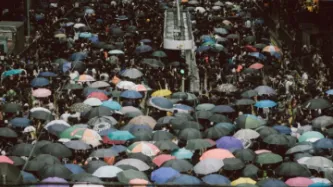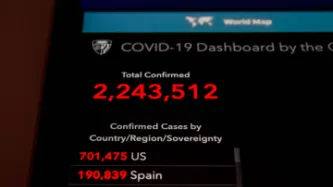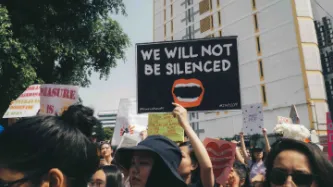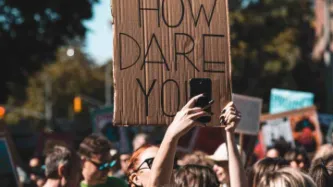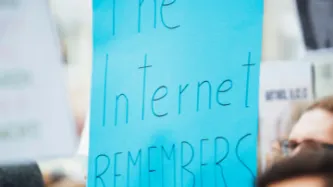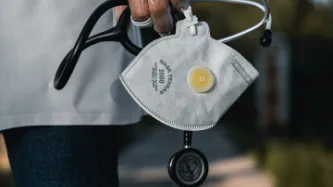Search
Content type: Long Read
This week saw the release of a coronavirus tracking app within the United Kingdom, initially to be trialled in the Isle of Wight. Privacy International has been following this closely, along with other ‘track and trace’ apps like those seen in over 30 other countries.
The UK’s app is no different. It is a small part of a public health response to this pandemic. As with all the other apps, it is vital that it be integrated with a comprehensive healthcare response, prioritise people, and…
Content type: Long Read
On 12 April 2020, citing confidential documents, the Guardian reported Palantir would be involved in a Covid-19 data project which "includes large volumes of data pertaining to individuals, including protected health information, Covid-19 test results, the contents of people’s calls to the NHS health advice line 111 and clinical information about those in intensive care".
It cited a Whitehall source "alarmed at the “unprecedented” amounts of confidential health information being swept up in the…
Content type: Long Read
Coronavirus-related lockdown measures have impacted almost 2.7 billion workers, with some countries seeing unprecedented levels of applications for welfare benefits support.
In response, emergency relief legislation for welfare recipients has been fast-tracked worldwide, from the UK to Brazil. These measures, combined with the growing awareness of Covid-19's differentiated impact along the fault lines of class, race, gender and legal status, rightly seek to address the needs of…
Content type: Long Read
Today, migrant communities in the UK already face multiple well-documented obstacles in accessing healthcare, not least because of charges to access the National Health Service (NHS), as it is the case for non-EU migrants, and legitimate fears of data-sharing between the NHS and the Home Office.
In the current pandemic, in addition to these concerns, asylum-seekers face an impossible choice: risk exposure to coronavirus, or be unable to apply for asylum.
Individuals seeking…
Content type: Long Read
Photo by Cade Roberts on Unsplash
For those of you who don't spend the most productive part of your day scanning the news for developments about data and competition, here's what has been going on in the UK since summer 2019.
Basically, the UK competition authority started an investigation into online platforms and digital advertising last summer, and issued their preliminary findings in December 2019, concluding that Facebook and Google are very powerful in the search engine and social media…
Content type: Advocacy
For a long but fun analysis of the current competition and data state of play in the UK, click here.
Background
PI broadly welcomes the CMA’s interim findings, many of which correspond with issues of longstanding concern to PI and with the points raised in our response to the CMA’s Statement of Scope.
This includes the indication that Google and Facebook have a dominant or strategic position in major elements of the digital advertising market which can -at least, partially- be attributed to the…
Content type: Long Read
Today is 1st May, an international day of protest. It also marks a year since PI launched our new programme of work called ‘Defending Democracy and Dissent’.
One year on we find ourselves in a situation where 1 May protests in the streets will not be going ahead. Rights have been restricted around the world. Sadly we’re seeing some actors exploit this public health crisis to enhance their own power, expanding surveillance and opportunism.
Against this challenging back-drop we wanted to…
Content type: Long Read
UPDATE 21/07/2020: On Monday July 20th, the Israeli parliament approved a new bill allowing the Ministry of Health to rely again on the Intelligence Services to track people who may have been exposed to Covid 19 when the number of new cases reaches 200 and above per day. The authorisation is then granted for three weeks and can be extended if the numbers have not decreased. The new law will be effective until January 2021. As of July 21st and for at least the next three weeks, the Intelligence…
Content type: Case Study
IMSI catchers – International Mobile Subscriber Identity catchers – are a particularly intrusive technology being used by police to monitor protesters and intercept their personal information and communications.
IMSI catchers have been used - officially or in secret - across the globe to monitor protests, including in the US and Germany; in the UK, police forces have refused to disclose any information on their use but documents obtained by the Bristol cable show that nine police forces have…
Content type: News & Analysis
Political campaigns around the world have turned into sophisticated data operations. They rely on data- your data- to facilitate a number of decisions: where to hold rallies, which States or constituencies to focus resources on, which campaign messages to focus on in which area, and how to target supporters, undecided voters, and non-supporters.
While data driven political campaigns are not new, the granularity of data available and the potential power to sway or suppress voters through that…
Content type: Press release
Photo by Ashkan Forouzani on Unsplash
Today Privacy International, Big Brother Watch, medConfidential, Foxglove, and Open Rights Group have sent Palantir 10 questions about their work with the UK’s National Health Service (NHS) during the Covid-19 public health crisis and have requested for the contract to be disclosed.
On its website Palantir says that the company has a “culture of open and critical discussion around the implications of [their] technology” but the company have so far…
Content type: Examples
Police will be barred from accessing metadata collected by Australia's proposed coronavirus contact tracing app, which will be able to identify when users have been 1.5 metres of each other for more than 15 minutes, Australia's government services minister, Stuart Robert, and prime minister, Scott Morrison, have promised. Only state health investigators will access the data, even though experts say that the 2018 telecommunications laws potentially allow law enforcement access. Critics are…
Content type: Examples
The US Department of Health and Human Services has awarded a contract to build a database system, HHS Protect Now, to track the spread of the coronavirus across the US to the data-mining company Palantir. Palantir founder and investor Peter Thiel was US president Donald Trump's earliest and highest-profile Silicon Valley backer. The platform pulls data from across the federal, state, and local governments as well as health care facilities and colleges, and works with the Centers for Disease…
Content type: Examples
NHS England is using Yoti's digital ID card solution to verify health care workers' identity; the cards are added to staff phones, enbaling them to use a contactless ID app to prove their identity both online and offline. Yoti is providing the system for free for three months to all public health organisations, emergency services, and community initiatives working to contain the pandemic.
Source: https://www.biometricupdate.com/202004/uk-national-health-service-rolls-out-yotis-biometric-…
Content type: Examples
The Turkish Health Ministry's Pandemic Isolation Tracking Project is using mobile device location data to track patients diagnosed with COVID-19 and ensure they obey the government's quarantine requirements. Violators will be sent warning messages and their information will be shared with the police if they do not return to isolation. Law enforcement officers can access individuals' information during road stops. Before launching the system, the Communications Directorate obtained permissions…
Content type: Examples
When the phone belonging to an American University student in Taiwan, who was subject to 14 days' quarantine after returning from Europe, ran out of battery power, in less than hour he had received phone calls from four different local administrative units, a text message notifying him he would be arrested if he had broken quarantine, and a visit from two police officers. The phone tracking system uses phone signals to triangulate locations of the more than 6,000 people subject to home…
Content type: Examples
By May 11, the Swiss Federal Office of Public Health, working with EFPL and ETH Zurich, will launch a secure, decentralised system for contact tracing developed by the Decentralised Privacy-Preserving-Proximity Tracing (DP-3T) international consortium, whose Swiss partners are Ubique and PocketCampus. Other international partners include UCl, KU Leuven, TU Delft, the University of Oxford, and the Universirty of Torino. The system has been posted to Github as an open source protocol and will…
Content type: Examples
A data breach that posted 100 to 200 names, email addresses, and encrypted passwords online was found in the Belgian Covid-19 Alert! app, one of seven candidates for adoption by the Dutch government. The app identifies phones that have been close to each other via Bluetooth signals and can send them a message when one owner tests positive. The developers said the data leaked from a database relating to another project when the source code was hurriedly placed online for government scrutiny.…
Content type: Examples
Liechtenstein is the first European country to use biometric electronic bracelets to implement a real time coronavirus tracking programme. The bracelet, which sends skin temperature, breathing, and pulse, among other metrics, for analysis in a Swiss lab, is being offered to 5% of the population. The country, which acted early to prevent the epidemic, plans to roll the bracelets out to the entire population by autumn.
Source: https://inews.co.uk/news/health/coronavirus-testing-latest-…
Content type: Examples
Thousands of Israelis have been ordered into quarantine without any right of appeal based on cellphone tracking that may be wrong because phone geolocation is insufficiently fine-grained to tell the difference between two people being in the same room and being separated by a door when dropping off and receiving a food delivery. Numerous agencies are performing the kind of tracking formerly carried out only by the domestic security agency, Shin Bet. Among them are Shin Bet itself, which is…
Content type: Examples
In Haiti, the National Identification Office has been extremely crowded, despite the government requirement to avoid gatherings of more than 10 people. The cards, which include a photo, name, date of birth, and registry number, are required for bank transactions and other official purposes.
Source: https://www.voanews.com/science-health/coronavirus-outbreak/haitians-seeking-national-id-cards-say-government-violating-its
Writer: Sandra Lemaire and Matiado Vilme
Publication: VOA News
Content type: Examples
Ghana's opposition party, the National Democratic Congress, has blamed a spike in cases of COVID-19 on the National Identification Authority's refusal to suspend its registration efforts in the country's Eastern Region even though two citizens filed for a court injunction to halt the operation and even though the conditions violated the country's social distancing directives. Registrants were forced to share fingerprint scanners and wait in overcrowded conditions. Public pressure later forced…
Content type: Examples
An Accra High Court has ruled that the National Identification Authority can continue registering Ghanaians after two citizens filed a case arguing that continued registration violates the social distancing directive issued by president Akufo-Addo. However, a different division of the High Court granted a similar injunction filed by a group of 30 citizens, in force for ten days beginning on March 23.
Source: https://www.modernghana.com/news/992060/continue-with-your-ghana-card-registration-…
Content type: Examples
In a sharp drop from the beginning of Canada's lockdown, after two months only one in six Canadians left their home on weekends compared to one in three at the beginning. The marketing company Environics Analytics compiled the report by analysing a database of anonymised location data from 2.3 million mobile phones and looking for people who went at least 100 metres beyond their home postal code for a minimum of 30 minutes on at least one weekend day, and used demographic information tied to…
Content type: Examples
Three days after announcing Germany would adopt the centralised Pan-European Privacy-Preserving Proximity Tracing (PEPP-PT) standard for contact tracing, the country's chancellery minister Helge Braun and health minister Jens Spahn announced they would instead use the decentralised approach backed by Apple, Google, and other European countries. While both standards rely on Bluetooth connections between nearby phones, PEPP-PT would have required Apple's cooperation to implement, and the company…
Content type: Examples
The risk detection company Dataminr has created an AI system that analyses social media posts to predict the next hotspots for COVID-19 outbreaks. The company claims it successfully predicted spikes seven to 13 days before they occurred - in the UK, in London, Hertfordshire, Essex, and Kent, and in 14 US states. Rather than measuring aggregated data, the system looks for unique posts from individuals who say they have symptoms, have tested positive, or been exposed, as well as first-hand…
Content type: Examples
The Legislative and Constitutional Affairs Committee at the Egyptian Parliament approved 18 new amendments to section three of the country's emergency law granting the president additional powers to implement health and safety measures to curb the spread of COVID-19. The new powers include suspending or shutting down schools, universities, and government agencies; defer the payment of utility bills and extend tax deadlines; require Egyptian expatriates to commit to quarantine measures; ban both…
Content type: Examples
Eight days after instituting a gender-based quarantine schedule, Peruvian president Martin Vizcarra cancelled the measure two days before it was due to end. It had been met with a backlash from LGBTQ+ activists, who feared trans and binary people would face increasing street harassment from police. However, it also proved that because women do a disproportionate share of domestic work, gender separation forced them to gather in large groups on the days they were allowed out. Instead…
Content type: Examples
On April 20 Hong Kong authorities arrested some of the most prominent anti-China activists. The need to clear the streets to protect public health during the COVID-19 outbreak provided the authorities an opportunity to cripple the protest movement that had spread across the country beginning in mid-2019. Chinese officials in Hong Kong have also called for improved national security education in the city and for the passage of a national security law giving law enforcement and prosecutors…
Content type: Examples
The regulations brought in to curb the spread of COVID-19 in South Africa included directions published by the minister of communications and digital technologies that critics claimed violated the country's constitution. On the plus side, the regulations ordered service providers to ensure continued provision of internet and telecommunications services, and enabled temporary licensing of spectrum bands, which could increase internet capacity. However, the regulations also make publishing a…


